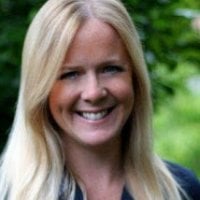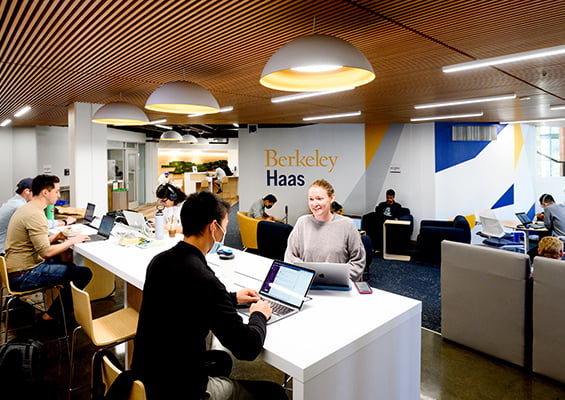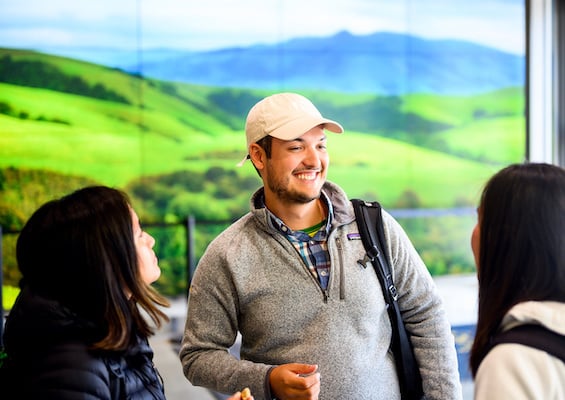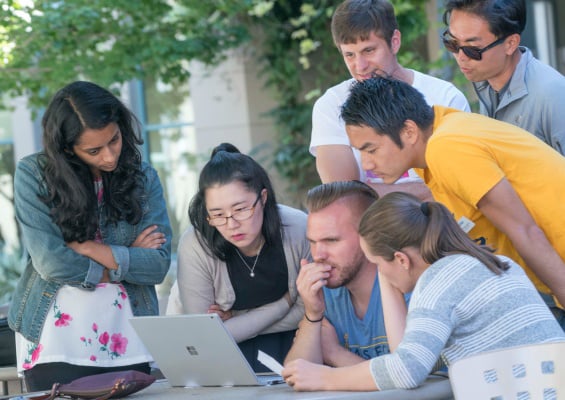The decision to pursue an MBA isn’t one big decision. Rather, it is a series of smaller decisions: Where? When? Which format? Why?
Join three Berkeley Haas part-time MBA students as they explore their decision-making processes and how well the program they chose is living up to their expectations.
Lauren Miller, MBA 25, is a wealth management business operations manager in Capital Group’s Los Angeles office. Her work experience consulting in the finance sector includes a stint at PwC. She is a weekend student in the Evening & Weekend MBA program.
Texas native Lisa Dalgliesh, MBA 25, is a talent, strategy & innovation manager in Deloitte’s Austin office. She has held similar roles elsewhere, most recently with Lockheed Martin and has an MA in Human Dimensions of Organizations. She is in the first Flex cohort of the Evening & Weekend MBA program , combining online courses and on-campus experiences.
Nakul Sood, EMBA 24, is senior director of business operations & management at Micron Technology in San Jose, CA. Before taking that role three years ago, he served as chief of staff to Micron’s EVP of Global Operations. He has an MS in Industrial Engineering and is in the MBA for Executives program.
The conversation has been edited for length and clarity.
Why did you choose to pursue an MBA at this point in your career?
Lauren: Working in the financial industry women often have to jump through more hoops than their male colleagues to advance. When I looked at my mentors, they all have MBAs. It seemed like an obvious check-the-box thing to do. But the real why, the underlying reason I’m here is to explore the intersection of financial services, technology, and social impact.
Lisa: Despite a graduate degree and 10 years of experience in what is broadly called human resources, I wanted to enhance my credibility. I needed more business acumen in order to help organizations understand and leverage ‘people operations” as a strategic differentiator in meeting their business objectives.
Nakul: Working in operations and supply chain management, I need to optimize my decision-making for our customers, our shareholders, and for the business itself. As I moved into a role that is more focused on business, I wanted to grow via a formal business education that would also give me access to a diversity of thought and experience by being part of an accomplished cohort.
Did you consider a full-time MBA program?
Nakul: A full-time MBA would have meant taking a hiatus from work and my career, which would have been both impractical and challenging.
Lauren: No. I’m at a point in my career where I did not want to slow down. Being in a part-time program allows me to explore new ideas while being on a dual track with my career.
Lisa: Like Lauren, I’ve come too far to want to take time off. Two other reasons: I didn’t want to disrupt my life and having an income while you are a student really helps.
How did you decide which program was right for you?
Nakul: My priorities were to immerse myself in the curriculum while studying with peers from other industries and disciplines. I also wanted to form lasting bonds with those in my cohort. Speaking with several graduates, including my wife, convinced me that the block schedule of the EMBA would deliver both. We learn and socialize together.
Lisa: I looked at the EMBA program, but I wanted a more regular and frequent cadence of classes. The part-time Flex program gives me that, and it offers the least disruption—both at home and with work. I also find it remarkable that a top-tier school like Berkeley Haas really lives up to the Question the Status Quo Defining Leadership Principle by designing a Flex option that caters to people who want to pursue an MBA, who want to become better leaders, but who don’t want to be tied to a campus-based program.
Lauren: I really wanted to be on campus. I love it. Before applying, I talked with Haas alumni and students in the LA area. They convinced me that the commute was worth it. I can fly round-trip on the same day. Some weeks it seems like half of the seats on the plane are occupied by Haas students. We’ve practically formed our own mini-cohort!
Does the reality of the program compare with your expectations?
Lisa: In terms of not disrupting my life, absolutely! I can be on a work call and make the switch to student within five minutes. And there are several benefits I hadn’t expected, one being the diversity of my classmates. I have classmates in Egypt, Germany, Japan, and Singapore, in addition to several different states. And I am impressed with how deeply invested my classmates are in the program—for themselves and for their classmates.
We are receiving 100% the same quality of instruction as any MBA student at Haas. The administration invested in the technology to create as close to a classroom experience online as possible. Of course, you do miss certain things, like casual conversations in the hallway. Slack and planned online get-togethers only take you so far. You have to be more intentional about making connections.
Lauren: The biggest surprise for me is how supportive and skilled my study group is. We all have jobs and lives and demands on our time, but we really work together as a team. We all bring different skill sets and backgrounds to the team, yet we all are ready to roll up our sleeves and get the work done. Better yet, we have fun doing it!
I’ve also been pleased at being able to be involved in co-curricular activities. Given my interests, the FinTech Club is a great resource. Even though I am not on campus, I can keep my finger on the pulse of club activities on Slack and there are often virtual options to participate in events during the week. Women in Leadership is a terrific way to connect with women who support each other and share ideas. It was easy to take a Friday off work and come up for a WIL retreat.
Nakul: My expectations have been surpassed. I find that the Defining Leadership Principles are put to use through the program and used as a framework. The program kicked off with an excellent primer on leadership communications and a foundation for building trust. The coursework and academic rigor have been intellectually stimulating. I can use the instruction and models we discuss back at work on the Monday after block. The Admissions team curated a cohort representing such diverse sectors: health care, fintech, software, which has expanded my horizons and provides perspectives from a variety of industries and disciplines.
Are you bringing your learning back to the job?
Nakul: Often! After our Leadership Communications immersion, I completely revised a presentation I was due to give to the executive team at work. I tossed out most of the tables and charts I had planned to use and instead, told my story. It was less about numbers and more about connecting with our customers.
I use those lessons often to help me manage change and be an authentic leader."
Lauren: At the same time that I started my MBA studies, I moved into a new role at work. I knew that I would be able to really cement my new learnings by using them in my new role. For example, Leading People in the first semester is like a crash course in management all by itself. I use those lessons often to help me manage change and be an authentic leader. What I’ve learned in our Marketing class has helped me feel much more proficient and competent in meetings with our marketing team, which makes me a more effective partner in that relationship.
Lisa: Not directly in terms of skills, but yes, in that I am learning how to use systems thinking. By that I mean, being able to pull together all of the threads needed to create a holistic talent strategy. I want to be able to understand all of the variables—not just talent—needed to achieve short- and long-term business success. I am beginning to see how that works in my classes, where an idea taught in one class pops up in another class, building on each other. I can’t wait to learn more.
Learn more about the Berkeley Haas part-time MBA program options and how you can achieve your leadership goals with the same top-ranked MBA.









